By Lucy Komisar
This is a children‘s story that cuts to the quick and speaks to the heart, that fascinates and shocks with its creativity and is definitely for adults. Besides that, it‘s a musical, with country and blues sounds and songs about woe, jazz and modern dancing, punning wit and horrific metaphors. There‘s even a classical painting that comes alive.
The British Kneehigh company production of “The Wild Bride,” based on the Grimms‘ fairy tale “The Handless Maiden,” is, says adapter/director Emma Rice, a romantic story about how long it takes to find yourself, how many bad bargains you make and other people make for you. It‘s a voyage of endurance and healing. Along the way, the creators use some jarring imagery to make their point.
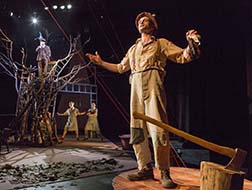
The blues band set on one side opens with a song of woe and a plaintive, “Won‘t somebody help me?”
The story of this innovative play, with text and lyrics by Carl Grose, is that The Devil (an excellent smarmy Andrew Durand in a brown vested suit), who is bored and enjoys putting folks to the test, tricks a poor farmer (a comic hayseed Stuart Goodwin) into trading whatever is in his yard for a mess of new clothes and riches. But it turns out that his beloved daughter (Audrey Brisson) is in the yard, hidden by the leafless branches of an apple tree. The Devil leaves his card, which says succinctly, “The Devil.”
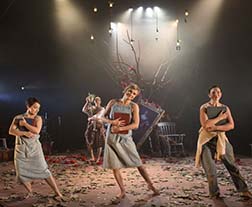
When The Devil returns to claim the girl, she won‘t acquiesce. She is too clean. So he orders daddy to set her in a tub and smear her with mud. Still no success. Then to make her abject, so she‘ll have no other choice in life, he orders the farmer to cut off her hands.
The farmer doesn‘t want to hurt the girl, and the language of his conflict with The Devil is expressed in the vocabulary of an aggressive Polish folk dance. (Meanwhile the girl has picked up an accordion and joined the band. The actors are all musicians.) The Devil insists that unless the farmer does as ordered, he will take the girl to Hell for eternal torment.
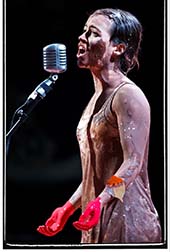
Three women (the very fine Brisson, Patrycja Kujawska and Etta Murfitt) play the girl at different stages of her life, pulling off their aprons to reveal flesh colored slips, to make the point that this is abused and suffering “Everywoman.”
The story is so clearly a fantasy that though you wince for a moment, you are caught up in the whimsy and the tough parts don‘t bother. The Devil, by the way, often speaks in rhyme.
Just as you‘ve gotten used to the “long ago and far away” fairy tale, the girl, with bloodied hands, comes to the microphone stage center and sings as if in a cabaret. Brisson has a fine, rich voice.
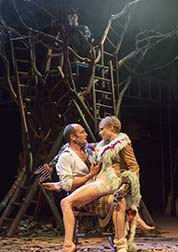
A charming bit involves the prince (Goodwin) in a short Scottish kilt and red sash, who finds that one of his orchard pears (a light bulb hanging from the branches) is missing: “A fruit crime!” He investigates. There is the sound of clanging doors and raising of a drawbridge. He declares, “I can wait all day; I‘m royalty, I don‘t do anything.” There follows a litany of puns. When he comes upon the young woman, he calls her “pear-fect.” And pointing to the light bulb/pear she has stashed in her bodice, “That‘s a royal pear you‘ve got there.” And, “You really are quite disarming.”
So, this horrific tale is really rather clever and funny. When the prince introduces her to his mother, we discover that the Queen is an 18th-century painting whose hands project out of the painted sleeves. One hand swishes a handkerchief. The young woman (Kujawska) ends up with a fur-trimmed cape and prosthetic hands that look like farm implements. But her trials are not over.
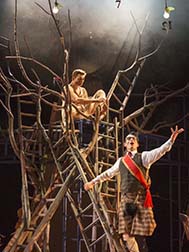
The Devil declares, “For a feminist folk tale, this book ain‘t that bad.” That‘s a pretty good judgment. The ensuing scenes show sex jocularly simulated to sounds of an accordion, a serious declaration that “The Devil brings war,” the prince’s departure to the army, smoke and staccato gun shots, a dastardly Devilish plot, and a couple of wonderful metal life-size puppets of the style of “War Horse.”
“The Wild Bride” is one of those productions that make the outer reaches of New York theater, in this case St. Ann‘s Warehouse in DUMBO, Down Under the Manhattan Bridge, sometimes so special.
“The Wild Bride.” Written by Carl Grose; adapted and directed by Emma Rice. Original music by Stu Barker; choreography by Etta Murfitt. St Ann’s Warehouse. 29 Jay St. Brooklyn, NY. Subways F to York Street; A, C to High Street; 2, 3 to Clark Street. 718-254-8779. Opened Feb 23, 2013; closes Mar 17, 2013. 3/8/13. Review on New York Theatre-Wire.

